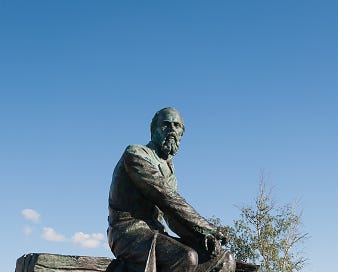Dostoyevsky, Destiny, and the Decembrists
How a chance meeting changed the course of world literature.
On Christmas Eve of 1849, Fyodor Dostoyevsky bid farewell to St Petersburg, huddled in a prison cart. He had begun his long and arduous journey to Siberia, where he was to serve his prison sentence: 4 years of hard labour + 4 years as a private in the army. Most crushing for him, he was barred from engaging in any writing activity for the duration of his sentence.
The final pitstop of the journey before entering prison was Tobolsk: the furthermost outpost of European Russia. It was here that Dostoyevsky met some Decembrists — exiles from an earlier failed revolution — who showered him with immense kindness and sympathy. The Decembrists of Tobolsk often came across soon-to-be prisoners, and would strive to implant positive ideas and memories into the minds and hearts of prisoners before they entered hell on earth. Amongst the Decembrists was Natalya Fonvizina, who would come to exert tremendous influence over the life of Dostoyevsky.
Fonvizina was descended from nobility and married a general, but followed her husband to Tobolsk when he was exiled. Her eldest son was a friend of Dostoyevsky from his literary circles and had died of consumption. It was Dostoyevsky himself who broke the news to her of her son’s death.
Dostoyevsky received her kindness gratefully, and years later would write to his brother Mikhail of the lasting impression made by the Decembrists:
I wish I could tell you in detail of our six days in Tobolsk and the impressions they left on me, but this isn’t the right place. I will only say that the sympathy and lively concern we met with blessed us with almost complete happiness. The exiles of the old days (that is, not they themselves but their wives) looked after us as though we were their own flesh and blood. What wonderful people, tried by twenty-five years of sorrow and self-sacrifice! We had only a glimpse of them, for we were strictly confined. But they sent us food and clothing, they consoled us and gave us courage.
Alongside kindness, sympathy, and money, Fonvizina also gifted Dostoyevsky a copy of the New Testament. It was the only book prisoners were allowed to possess, and virtually his only reading in prison (except for the times he was able to get his hands on Dickens).
Dostoyevsky’s continued engagement with the New Testament in prison was crucial to the evolution of his beliefs and ideas. He had left St Petersburg as a political radical and sceptic of organised religion (and in particular, Russian Orthodoxy), although he harboured an intense love for Christ. Upon his return to St Petersburg his religious transformation was incomplete, although it had been set in motion.
In the process of his rediscovery of faith, he would write to Natalya Fonzivina, with whom he felt an affinity and shared sense of tragic loss. In one letter he wrote:
Such awful torments I have suffered and I still suffer now from this thirst for faith, which is always the stronger in my soul the greater are my arguments against it. And yet God sometimes sends me moments when I am completely at peace; at those times I love, and I find that I am loved by others, and in such moments I have composed for myself a symbol of faith, in which everything for me is lucid and holy. This symbol is very simple, it is: to believe that there is nothing more beautiful, profound, loving, wise, courageous and perfect than Christ, and not only is there not, but I tell myself with jealous love that there cannot be. What is more, if someone proved to me that Christ was outside the truth, and it was really true that the truth was outside Christ, then I would still prefer to remain with Christ than with the truth.
Throughout the remaining decades of Dostoyevsky’s colourful life, from the rehabilitation of his public image to the publication of his classics, and the crippling gambling addiction that haunted him, he maintained this copy of the Bible gifted to him by Natalya Fonvizina. Upon his deathbed he requested his wife to bring that very copy to him. His wife opened the New Testament and began reading from where it fell upon:
Let it be so now; for thus it is fitting for us to fulfil all righteousness (Mathew 3:15)
Dostoyevsky interpreted the passage as a sign of his impending death. He thanked his wife for her love and loyalty, and soon after, fell into a coma and passed away.
Dostoyevsky left St Petersburg as a writer with a muddled belief system, and publications of middling reception — having published Poor Folk and The Double. He returned with a new perspective on faith, one that would shape the classics for which he was to become immortalised. If history has preserved the name of Fyodor Dostoyevsky, and if his books adorn your bookshelf, then know that this was only possible because of a kind, exiled woman living in Siberia.
We all make plans in life. Some will come to fruition, and others will fall by the wayside. But we should not view our detours as disasters. These purported failures are often the conduit for chance meetings, for the wily ploys of fate to alter one’s path in life in ways hitherto inconceivable.
Do not belittle any discussion, interaction or conversation with anyone whom you meet. You may unwittingly be destiny’s disruption into your interlocutor’s life; the flicker of hope that kindles their faith in the harsh winters of their life.






Beautiful Ali
Ali, this is such a good essay! Love how it turned out.
Celebrate this one :)